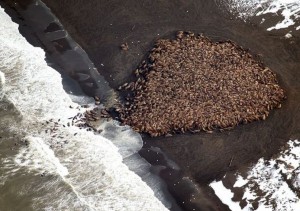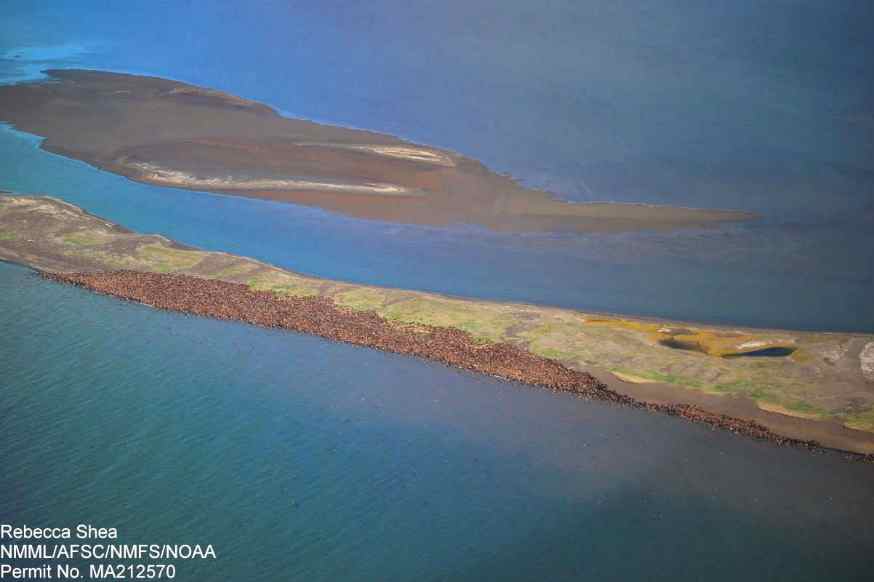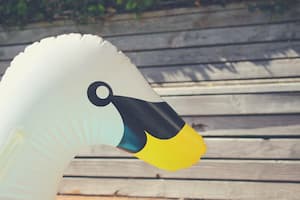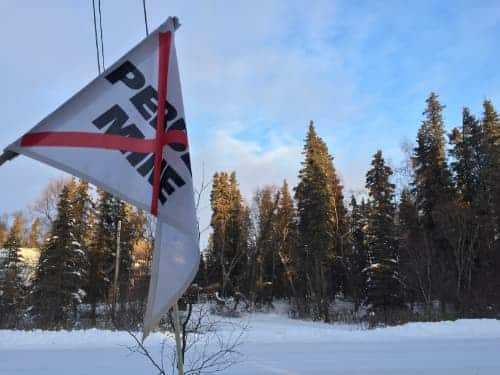
Anchorage, AK — The U.S. Fish and Wildlife Service (Service), the Eskimo Walrus Commission and the Qayassiq Walrus Commission are requesting your help in preventing disturbances to Pacific walruses resting on shore in Bristol Bay and along the Chukchi Sea coast. Walruses are extremely susceptible to human-caused disturbances, and often panic when startled by unexpected smells, sights or sounds. This can cause them to stampede to the safety of the water, and smaller animals can be tramped and injured or killed.
The Service has developed guidance for mariners, pilots and those traveling on land to avoid causing a disturbance. For those recreating or working on shore, haulouts should not be approached with motorized vehicles. Those viewing or passing haulouts on foot should make sure to do so in such a way that the animals remain unaware of your presence. Pilots operating near haulouts should maintain adequate distance and altitude from hauled out walruses according to Service guidelines. Mariners should remain between 0.5 and 3 nautical miles (nm) away from haulouts depending on the length of your vessel, and refrain from anchoring or conducting fishing operations within 3 nm with any size of vessel. The Service is currently working with the National Oceanic and Atmospheric Administration to update nautical charts with the current guidance.
Walrus haulouts can form on beaches anywhere in their range, but there are some habitual haulout areas to be aware of. In Bristol Bay, haulouts often occur from March through December at Round* and Hagemeister Islands, Capes Peirce, Newenham, Seniavin, Greig and the Cinder River. Along the Chukchi Sea coast, haulouts frequently occur from July through November on a barrier island near the community of Point Lay* and beaches near Cape Lisburne. Haulouts are also common on the Punuk Islands near Saint Lawrence Island from October through December. At any haulout, there are likely to be animals in near-shore waters as they move between haulouts or to and from offshore feeding areas.
Find the guidelines and learn more on the U.S. Fish and Wildlife Service website.
Learn more about the Eskimo Walrus Commission and the Qayassiq Walrus Commission.
*Round Island is part of the Walrus Islands State Game Sanctuary and there are additional restrictions specific to the area, which are available here.
*The Native Village of Point Lay, the local tribal government, has taken a leadership role in the stewardship of the walrus haulout near Point Lay and respectfully asks those who must travel in the area by boat or plane to follow guidance developed by the U.S. Fish and Wildlife Service to avoid disturbing the animals. They also request that mariners maintain a greater distance (5 nm) from walrus haulouts near Point Lay.
In the United States, all marine mammals are protected under the Marine Mammal Protection Act, which makes it illegal to disturb or harass them. In simple terms, it is unlawful to change the behavior of any marine mammal in its natural environment without specific authorization to do so. The MMPA provides exceptions for a variety of activities, including authorized scientific research and subsistence harvest by Alaska Natives. Violations of the MMPA are punishable by fine up to $100,000 and one year of imprisonment. See 16 USC 1361-1407.
To report incidences of harassment or injury, please contact the U.S. Fish and Wildlife Service, Office of Law Enforcement by calling 1-800-858-7621.
Source: U.S. Fish and Wildlife Service
[content id=”79272″]








